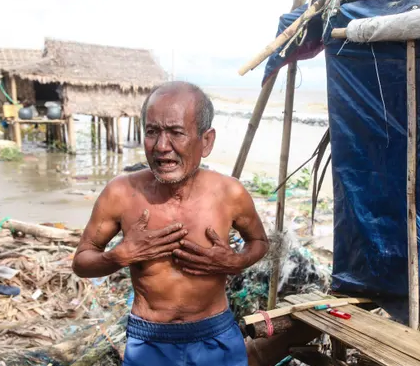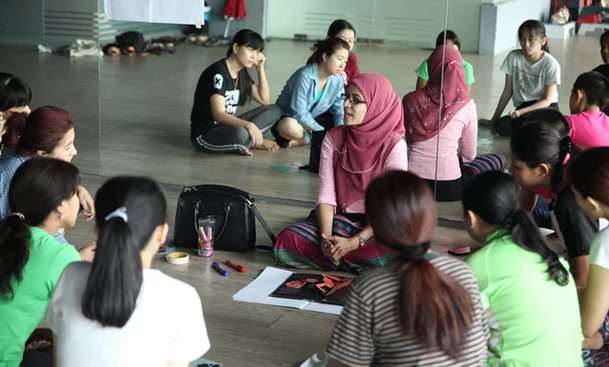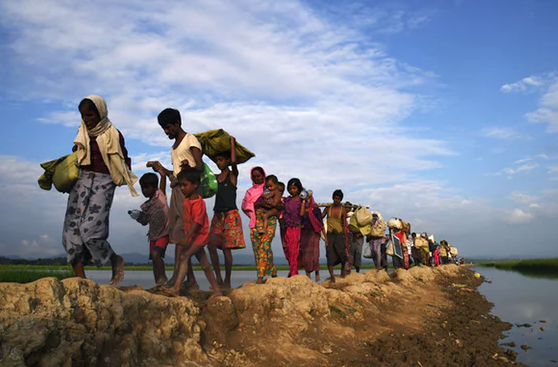FEATURES
Myanmar's land game
Giving back land to the landless or wiping the slate clean for investors?
A new land law could convert indigenous landowners to trespassers on their own land overnight.
Myanmar Opens Up for 'The Vagina Monologues'
Before 22-year-old Phoo Myat Thwe stepped on stage last night to read a monologue in downtown Yangon, her hands went cold.
“I suddenly didn’t know if I could do it - utter moans of sexual pleasure on stage,” says Phoo.
'We feel like hermit crabs': Myanmar's climate dispossessed
In the coastal town of Khindan, the catastrophic effect of rising sea levels is all too apparent.
“The well used to be the centre of our village,” Mya Htay says.
Myanmar LGBT Pride Out in Force, But Laws Lag Behind
As David Morena lightly powders his nose, he stops for a moment, gazes at his reflection and quickly assesses his stage make-up design one last time.
“When I first heard Lady Gaga song I suddenly felt so free,” said Morena. For years, he was afraid to tell his family he was gay out of fear of being kicked out of the family home.
The Human Cost of Myanmar’s Jade Mines
“We wanted to have my son’s portrait up but the children just keep crying,” explains Seng Roi as she reaches into a box under a wooden bed and retrieves her son’s portrait.
Marandong Dee Ram had decided to work in Myanmar’s jade mines so he could afford to build a house for his family. He worked in the mines for six years, until he was killed in a landslide.
In Myanmar, #MeToo Opens Up Conversation on Sexual Harassment
When Nandar was just seven years old she was sexually harassed.
A family friend whom she was told by her mother to call "Grandpa" would very often grab her between her legs and kiss her.
"Every time I saw him entering our house, I would find a way to hide." When she told her mom she didn't like the way he touched her, her mother would dismiss Nandar's complaints and insist, "go with him, he loves you."
A few years later another incident occurred.
Myanmar Land Grab Fears Stoked by New Law
A new land conflict is threatening to erupt in Myanmar, where land is so sought after that even a cemetery can be eyed by developers.
To protect her village's graveyard, 57-year-old Bawm Lawm began a sit-in protest.
Meth Seizures Up in Myanmar, SE Asia
Drug seizures reported across Southeast Asia indicate this year will be another record high for methamphetamine production in Myanmar. The focus is usually on government efforts to stem the trade, but beyond the headlines, meth use also has a tragic personal side.
“Put in a cage” Rohingya in Myanmar consigned to life of fear
Twelve months after brutal attacks by Burmese military sent 700,000 Rohingya pouring into Bangladesh, the group is barred from healthcare, work and school.
The jade scramble: Life at the bottom of the mines
Three years since the jade trade was revealed to be worth 31 billion dollars, questions still abound about what improvements have been made by Aung San Suu Kyi’s government to share these revenues.
Facebook Myanmar: ‘the problem of hate speech has not gone away’
In a nation where ethnic and religious hatreds have long simmered and occasionally boiled over, social media represents a brave new digital frontier where news battles with hearsay, gossip and threats that can have deadly consequences
Untangling Myanmar’s trade in human hair
Aye Aye Thein, 55, cuts hair for a living at Insein market in the north of Yangon, Myanmar's largest city.
But unlike most hairdressers, she doesn't charge her customers. Instead, she pays them.
Myanmar's meth crisis reaches as far as Australia
In Myanmar, the more conflict there is, the more drug production you'll find.
And the trade has brought together unlikely friendships.
Last year, Myanmar soldiers drove 700,000 Rohingya from their homes in Rakhine state, often burning their villages to the ground. Now, some of the same soldiers
Sex, taboos and #MeToo - in the country with no word for 'vagina'
There’s a hpou (a child’s toy), tayat ywa (mango leaf) and mout paung (sweets).” Pausing in her list of euphemisms, Dr Thet Su Htwe leans in to the microphone. “And even samosa,” she adds.
“Why are we still afraid to say the word ‘vagina’?” the doctor asks finally.
Myanmar: pleas for release of Reuters journalists mount
Calls for the release of two Reuters journalists who have been in prison in Myanmar for more than six months are mounting ahead of a key hearing in their trial on Monday.
Wa Lone and Kyaw Soe Oo were arrested in December over their reporting, which uncovered a massacre against the Rohingya.
Myanmar’s invisible war on the Kachin Christian minority
While global attention is fixed on the Rohingya crisis, another ethnic minority is at risk of being crushed by the military. In the country’s north, in the state of Kachin, where another brutal but far less well publicised conflict is playing out between the largely Christian minority group and government militias.
Myanmar's women face routine pregnancy tests and sexual harassment in sweatshops
Myanmar garment worker Ohn Mar Khaing doesn't bat an eyelid as she shares her standard work routine — six days a week, 8.00am to 9.00pm.
But she's suddenly nervous talking about the journey to and from the factory.
"If I am working overtime, there is no bus, so I have to walk or take a motorbike taxi," the 19-year-old says.
Revealed: Facebook hate speech exploded in Myanmar during Rohingya crisis
Hate speech exploded on Facebook at the start of the Rohingya crisis in Myanmar last year, analysis has revealed, with experts blaming the social network for creating “chaos” in the country.
Evidence of the spike emerged after the platform was accused of playing a key role in the spread of hate speech in Myanmar at a time when 650,000 Rohingya refugees were forced to flee to Bangladesh following persecution.
One man's mission to save Rakhine culture and history
For years in Myanmar, if Kyaw Hla Maung, a historian, were to roll up his sleeves and bare his arms he might have been arrested.
His arms are tattooed with an unusual a script with vertical, horizontal and diagonal lines and clusters of dots, the ancient Brahmi language of the Rakhine or Arakanese people from Myanmar's Rakhine State.
NPR:With Cupcakes And Courage, Myanmar Stages 'Vagina Monologues
Last weekend The Vagina Monologues was performed for the first time in Myanmar. Audiences loved it. Each performance was filled to capacity.
But right up to the opening curtain of the free event, organizers worried that the country might not be ready for a politicized play about female genitalia and empowerment. After all, when they called a sweet shop in Yangon, the country's largest city, and asked for a culinary tie-in — vagina-shaped lollipops — the proprietor hung up.
Mrauk U: tensions, protests and its bid for UNESCO
Should tourists still visit the historical site, previous capital of the Arakan Kingdom Mrauk U?
To add to the Rohingya violence in the norther Rakhine State, on 16 January police opened fire on a protest as locals in Mrauk-U gathered to protest against the arrest of a local Arakanese writer and the authorities’ decision to ban a commemoration marking the Arakan dynasty.
Seven people were reported dead and 12 protesters were severely wounded by police gunfire.
Can tourism help to rebuild peace?
The Punk Rockers and Activists Defying Anti-Rohingya Hate in Myanmar
hen filmmaker Kyal Yi Lin hopped into a taxi in Myanmar’s largest city, Yangon, in early September she had an unexpected conversation.
“This beard here, it doesn’t mean I am Muslim,” the driver said, gesturing to his graying goatee,“ I just like the beard.” Kyal Yi Lin nodded and went back to scrolling through her phone, but she couldn’t help asking him what he meant.
“People are not taking my taxi because they think I am Muslim,” he said.
Life or death: Giving birth in Burma
Every year 2,800 women die during pregnancy or during childbirth in Burma.
Why is the number so high?
Chin State, marked by change, looks to hold on to its roots
“At the age of 10, I got my tattoos,” says Ma Lha Sen.
Tracing with her finger the spiderweb-like design covering her face, she retells the two-day, painful process. “It started here,” says the 70-year-old, gesturing at her forehead.
When I ask about the origins of the tattoo tradition she shrugs. “My parents made me get the tattoos. Everyone in the Laytu tribe had to get it.”
Although history books written by Westerners tell tales. . .
The slow climate burn in Chin State
“We need to let people know that this is extremely serious but without going into the doom and despair, because that isn’t really helpful,” Chief Technical Advisor from Myanmar Climate Change Alliance (MCCA), Pascuale Capizzi.
Myanmar is ranked second out of 183 countries most affected by extreme weather events between 1995 and 2014 in the Global Climate Risk Index, and things don’t seem to be slowing down.
Karen Refugees Wary of Return to Myanmar as Despair Rises in Camps
On the Thai-Myanmar border, refugees who fled one of the world’s longest civil wars live in limbo, with alarmingly high suicide rates. As their options for resettlement narrow, some are beginning to return to Myanmar and the challenges of reintegration.
28 refugees have died by suicide and a further 66 have attempted it in the past two years according to a study by the International Organization for Migration (IOM).
Myanmar's Media in Chains
What is shocking is that now, under the current democratically elected government, journalists are still facing intimidation, threats, and restrictions from reporting in certain areas in the country, creating black spots of information.
“Myanmar is fast approaching the bottom of the press-freedom barrel,” said Matthew Smith, chief executive officer of Fortify Rights. “The authorities are cracking down on those who expose the truth. It’s crass, ugly, and right out of the authoritarian toolkit.”
Myanmar's textile workers pay the price for Australia's fast fashion addiction
Garment workers in Myanmar are struggling to cover everyday living costs while factory owners enjoy the surge in demand from the global fashion brands expanding into Australia.
Ma Thae Thae Mar works at a textiles factory outside of Mandalay and earns the minimum wage of 3,600 kyat ($3.40) for an eight-hour working day. The daily rate just covers the cost of food for herself and her child.
Too young to toil: Burma's child labour epidemic
The government has taken the first step to address the rampant problem of child labour throughout the country by drafting a five-year National Action Plan to eliminate the worst forms of child labour.
There are some 1.3 million child labourers in Burma, according to the Ministry of Labour, Immigration and Population, but the real number is estimated to be much higher.
In Burma, garment industry booms — and labour unions pay the price
Discrimination against workers standing up for their rights in Burma’s garment industry was highlighted this month after a union leader was fired and employees’ overtime pay went neglected for more than a year at a factory supplying global fashion brand H&M.
At Hangzhou Hundred-Tex Garment Company, a factory on the outskirts of Rangoon, workers first staged a demonstration calling for their overtime work to be paid in December last year. The workers hadn’t been paid overtime for 15 months.
Can agriculture, small loans lead Chin State to a fertile future?
Challenges abound, but so too does hope that the right set of policies can spur development in this remote part of Burma?
It’s mid-morning in Falam and the cotton-candy clouds are hanging low around each mountain peak during a recent DVB visit to this township in Chin State. The region is known for being one of the most isolated, underdeveloped regions in Burma. Others might characterise it in even less flattering terms.
“It’s the so-called wasteland of Burma,” says Ye Min Aung, vice president of the Myanmar Rice Federation, speaking nearly 500 miles to the southeast in the commercial capital Rangoon about challenges for agriculture in Chin State.
Lifting the lid on child rape
The story of a three-year-old in Sagaing Division sheds light on a long-hushed issue in Burma: child rape, reports of which have risen 40 percent this year.
A child was raped in May. She was only three years old.
“We were at work when it happened,” explains mother Lhing Boi. The child was too young to walk to the toilet by herself in the rain, so a family friend offered to take her. Then, that family says, he raped her.
Domestic violence: Customary law discourages divorce
“When I saw my children’s faces it was very difficult. I decided that getting beaten up every night is just one thing [compared to leaving my children].”
“I just felt like I wanted to die. I didn’t want to live in the world anymore,”40-year-old Neng Kho Lhing said, describing how she felt after five years of marriage, facing daily beatings from her husband. She said that during the first two years they were happy together, but after she gave birth to a second daughter, he started to hit her.
For Neng Kho Lhing, an ethnic Kuki, divorce was never an option.
Contraceptives: The final taboo
In a country where the subject of sex is still shrouded in shame, teaching young people how to prevent unwanted pregnancies remains a challenge.
“Can I get pregnant from sitting on a toilet seat?” asks one concerned young girl to a hotline counsellor in Rangoon. “A man used the public toilet before me and there was urine on the seat and I sat on it…”
Women in Burma are so worried about getting pregnant out of wedlock that 22-year-old youth counsellor Khin Su Yi receives many such phone calls every day.
Burma’s broken system silent on violence against women
Recent revelations about sever abuses inflicted on two young housemaids have highlighted the need for better protection of the rights of girls and women.
Last week photos emerged of two girls who were tortured in a tailor shop. One girl was burnt, stabbed and had her fingers broken. The girls were aged 11 and 12 when they were sent to work in the shop. Their working conditions deteriorated rapidly and they were held like slaves for five years.
It wasn’t until a local journalist who happened to work near the tailor shop decided to investigate that the girls’ suffering finally came to light.
Mae La Oon refugee camp: Living in limbo
Life in a refugee camp is never easy, but for many who have lived in Mae La Oon for much of their life, the thought of leaving brings anxieties of its own.
When Saw Eh Doh Moo fled to Thailand during an outbreak of fighting in his village, he wasn’t scared — but he was exhausted and hungry.
“I was used to hearing bombs since I was very young,” he says, recalling that he was frightened the first time he heard the sound of gunfire, but soon became accustomed to it. “I heard it again and again, so we just took it as normal.”
Testing the new era of artistic freedom
Burma's artists explore the possibilities of creative life in the post-censorship age
"Have you been to the national library?" asks San Mon Aung. The author and local publisher at WE publishing house and NDSP Books sits opposite me, on the edge of his stool, leaning his elbows on the table supporting his animated hands he talks. It's only 10 minutes into the interview and already the tables have turned and he's the one asking the questions
Kickstarting the economy from the classroom
Education Education reform in Burma is underway — and not a moment too soon.
Preparing for an exam is stressful in any country, but in Burma, students really have to know their stuff — right down to the last word.
“There’s this example in the exam where you have to fill in the gaps with the correct word,” explains Chris Spohr, the Asian Development Bank (ADB) social sector specialist in Burma. “Only, you can’t use synonyms — you have to regurgitate the exact words from the textbook.”
The road to rural healthcare reform
Mismanagement and a chronic lack of funding during 50 years of military rule are the main culprits for the poor state of healthcare in Burma today.
When Mon was born he had a lump at the back of his head. The midwife advised his family to go to Rangoon to see a surgeon; but first, she said, he needed treatment for his jaundice. By the time that was completed, they had spent 50,000 kyat (US$39) — more than a month’s income — and the lump was bigger that Mon’s head. Desperate, his mother borrowed as much money as she could for the nine-hour trip to...
Building bridges – with hair
Women across Burma are choosing to cut off their hair and donate it to a monastery that is building new bridges across the country.
“I’ve been growing my hair for nine years,” says 25-year-old Myo Myo Aung as she swings a lock of hair over her shoulder and calmly rests her hands on her bulging pregnant belly. “I decided to sell my hair originally because I was having a baby, but then a lady at work said, ‘Instead of just cutting it and selling it, why don’t you donate it and do good deeds?’”
Living on 10 baht a day
Expectations are high that this week’s visit to Thailand by Aung San Suu Kyi will help raise awareness of issues affecting the millions of Burmese migrant workers in the country.
Kaew Cho knows what it’s like to have his freedom taken away from him.
After moving between casual jobs on soybean, garlic and rice plantations, he went to work in a factory in Bangkok, hoping he would get paid at least the minimum wage.
Eliminating sexual violence in conflict areas
As war continues in Burma’s border areas, calls grow to end attacks on women.
“Do you have an emergency basket at your door?”
This is a question that Ph.D. candidate Jenny Hedström soon learned to ask whenever she interviewed Kachin women about their support for and involvement with the Kachin Independence Army (KIA) for her research on gender, peace and security issues in Burma.










































